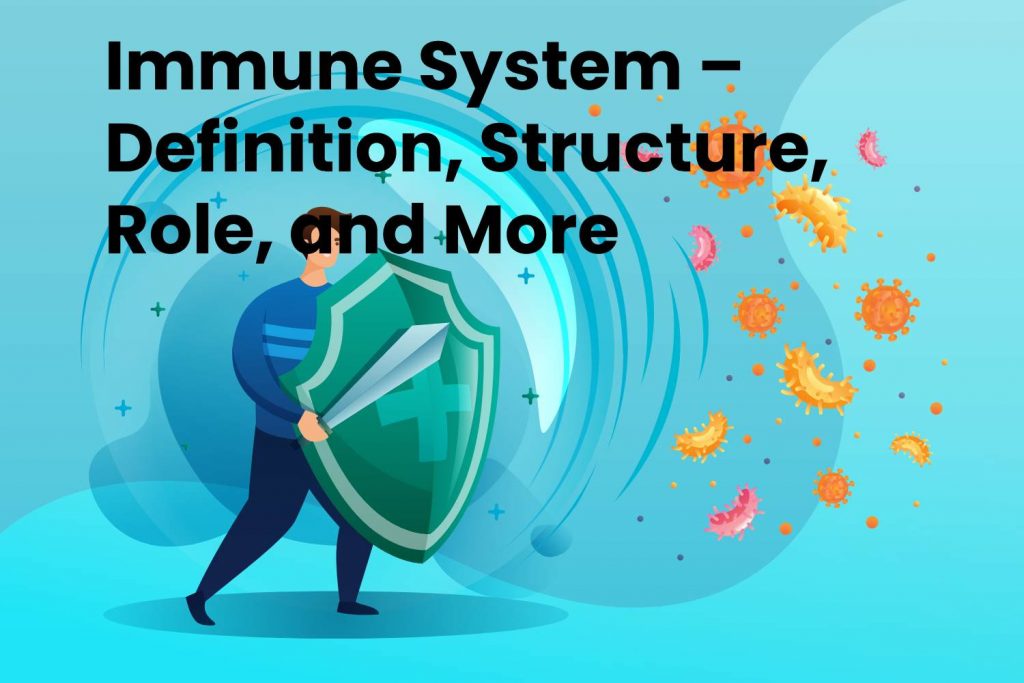Table of Contents
Definition
Immune system – The immune system is a set of organs, tissues, cells, and enzymes united for the same purpose: to protect the body.
Structure of the Immune System
Therefore the immune system has two parts
Innate immune response (non-specific)
Acquired immune response (specific)
The innate immune response is the first non-specific response to foreign threats. Immune cells recognize potential danger, sound the alarm, and the inflammatory response begins.
Learn More about the Innate Immune System Response
The acquired immune response is a specific attack against foreign threats. Thus, Key players in the received immune response include T cells, B cells, and antibodies:
T cells are immune cells with different responsibilities. For example, helper T cells interact with B cells as part of the antibody production process and activate cytotoxic T cells to target the identified pathogen. And also B cells are immune cells that can circulate throughout the body, interact with antigen-presenting cells, activate helper T cells, transform into plasma B cells, and mass produces antibodies.
Therefore, Antibodies are proteins produced by B cells explicitly designed to recognize a unique foreign substance called an antigen.
Role of the Immune System
What is Immunological Memory?
T-cells, B-cells, and antibodies also play an essential role in creating immunological memory: the ability of the immune system to store information about a specific pathogen in preparation for future attacks by the same pathogen. Immunological memory is an essential concept for creating vaccines, which works by triggering an initial immune response. That makes immunological memory without developing the disease. So when an individual encounters the “real” pathogen, the system is already equipped with the specific machinery to protect the body.
How can Nutrition Support Immune Health?
The immune system needs energy and nutrients to produce a functional immune response. Specific nutrients impact the physiological mechanisms involved in the inflammatory response, such as the recruitment of cells and chemical mediators that communicate between system cells.
What are Antioxidants?
Certain nutrients can act as antioxidants, which thwart the production of free radicals, a natural part of the inflammatory response. Balancing reactive oxygen species levels during the inflammatory response is essential in ensuring the body does not suffer undue damage while the immune system fights an infection.
Micronutrients and phytonutrients that serve as antioxidants include:
Vitamin E
V C
V D
Zinc
Selenium
Carotenoids
Polyphenols
Resveratrol
Gallic acid
Other food components involved in immunity
Magnesium
Amino acids
Nucleotides
Medicinal Mushrooms (Maitake; Turkey Tail)
fermented whole food
omega-3 fatty acids
How can Exercise Support Immune Health?
Regular exercise is a fundamental part of the holistic approach to health, nutrition, stress management, and healthy sleep habits. Recent studies show that regular, thus moderate physical activity can temporarily support immune health by helping cells identify and target pathogens and, in the long term, delay the adverse effects on the system. Thus, develop with age.
Stress
How can Stress Affect Immune Health?
Therefore, Chronic stress can negatively impact the system by excessively elevating levels of pro-inflammatory cytokines, natural killer cells, and T cells.
How can Sleep Affect Immune Health?
Maintaining a regular sleep cycle is associated with regulating T cells, antigen-presenting cells, natural killer cells, and chemical messengers involved in the immune response. Healthy sleep habits can also promote the development of immunological memory.
How can you Improve your Sleeping Habits?
Improve and maintain healthy sleep habits by:
Follow a consistent sleep routine
Practice regular physical activity
Eat a balanced diet based on whole foods with lots of fruits and vegetables
Limit screen time, especially in the hours before bedtime
How does Aging Affect Immune Health?
Therefore, Ageing is a natural part of life, and in general, it is associated with the body’s reduced ability to resolve the inflammatory process and balance the immune response. However, a healthy lifestyle can maximize the length of time specific physiological mechanisms in the body can function correctly.
Immune System – Immune Support FAQs
Therefore, People often ask –
How can I boost my immune system quickly?
How can I boost my immune system?
What are the signs of a weakened immune system?
Which herbs are suitable for the immune system?
